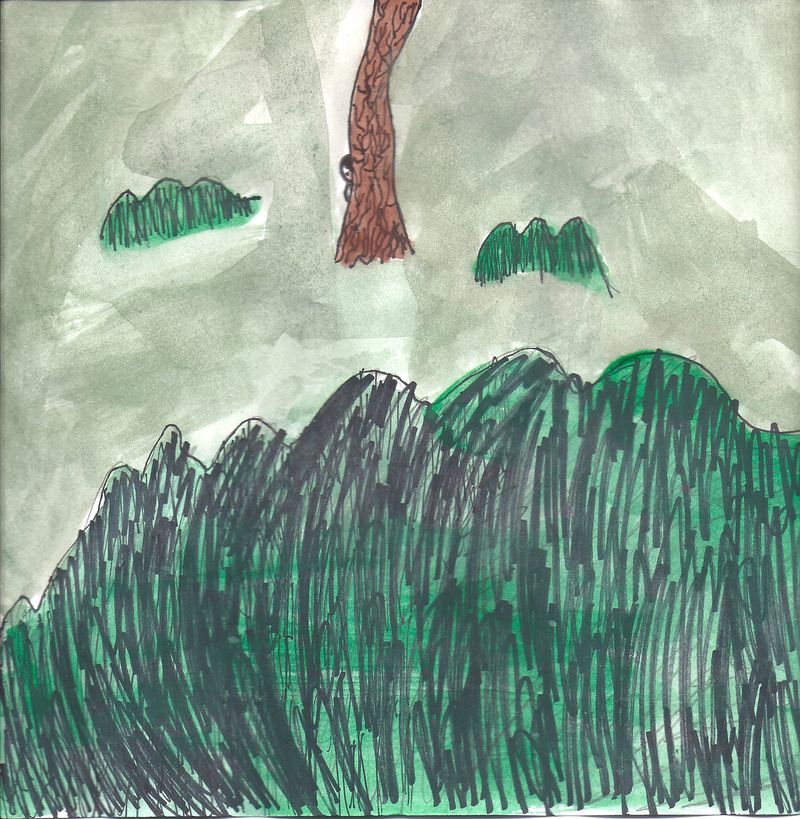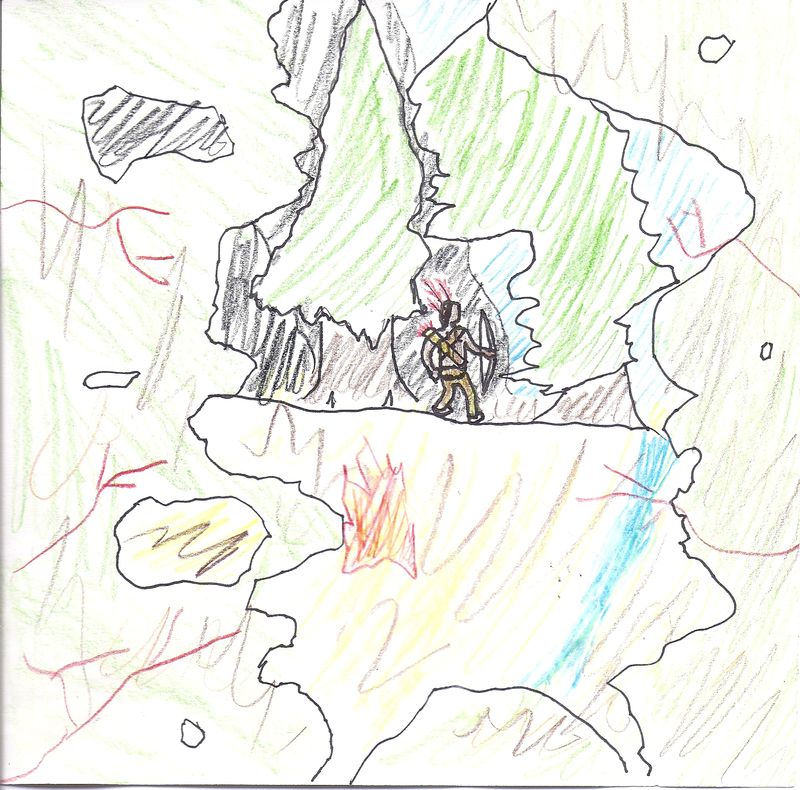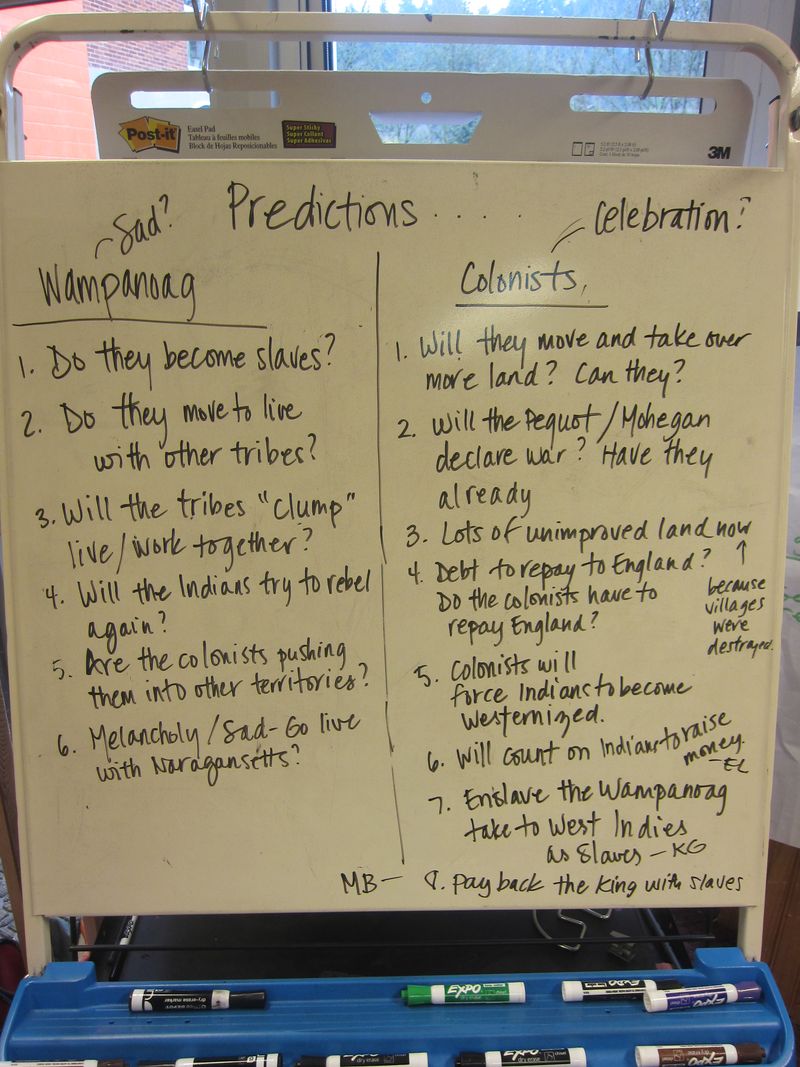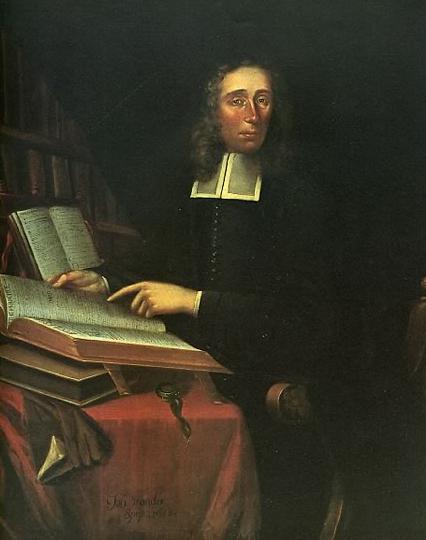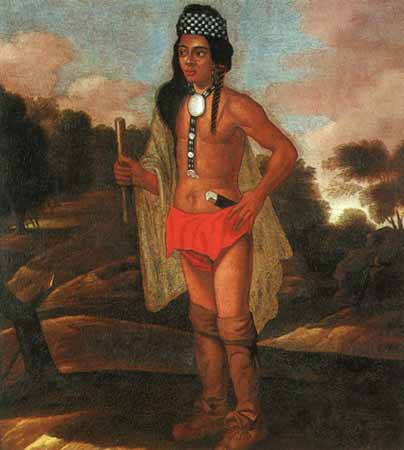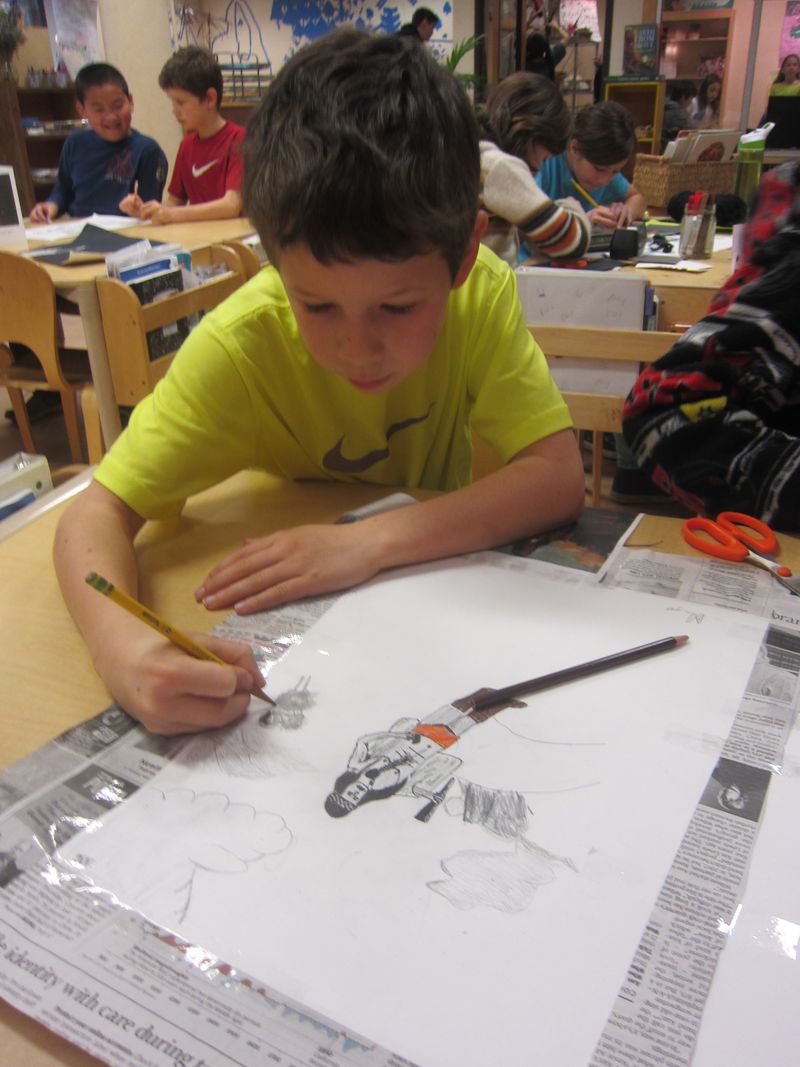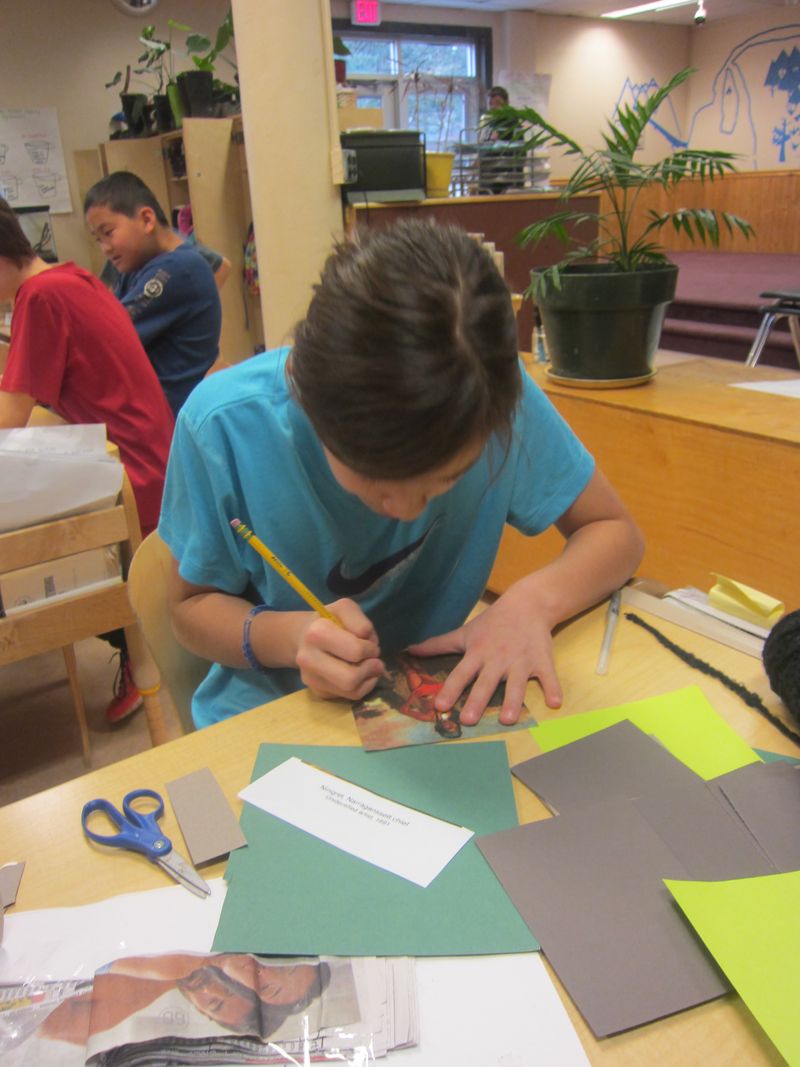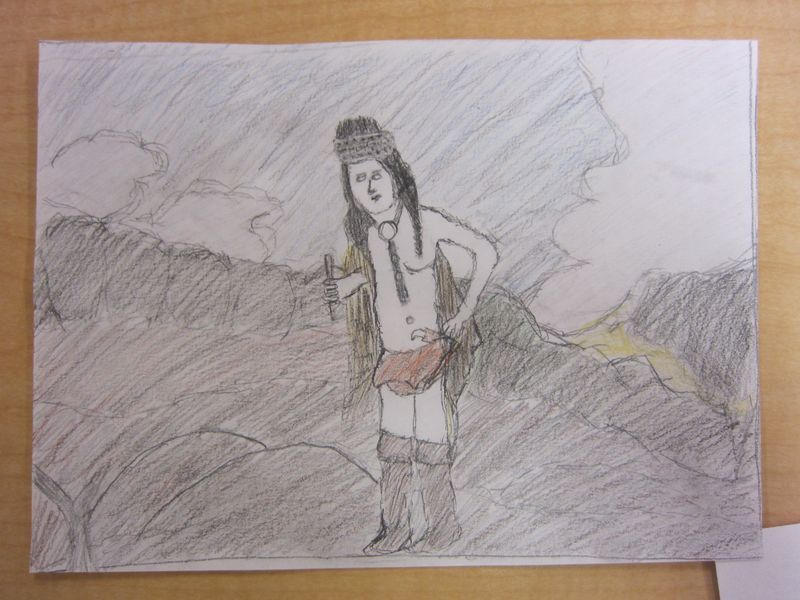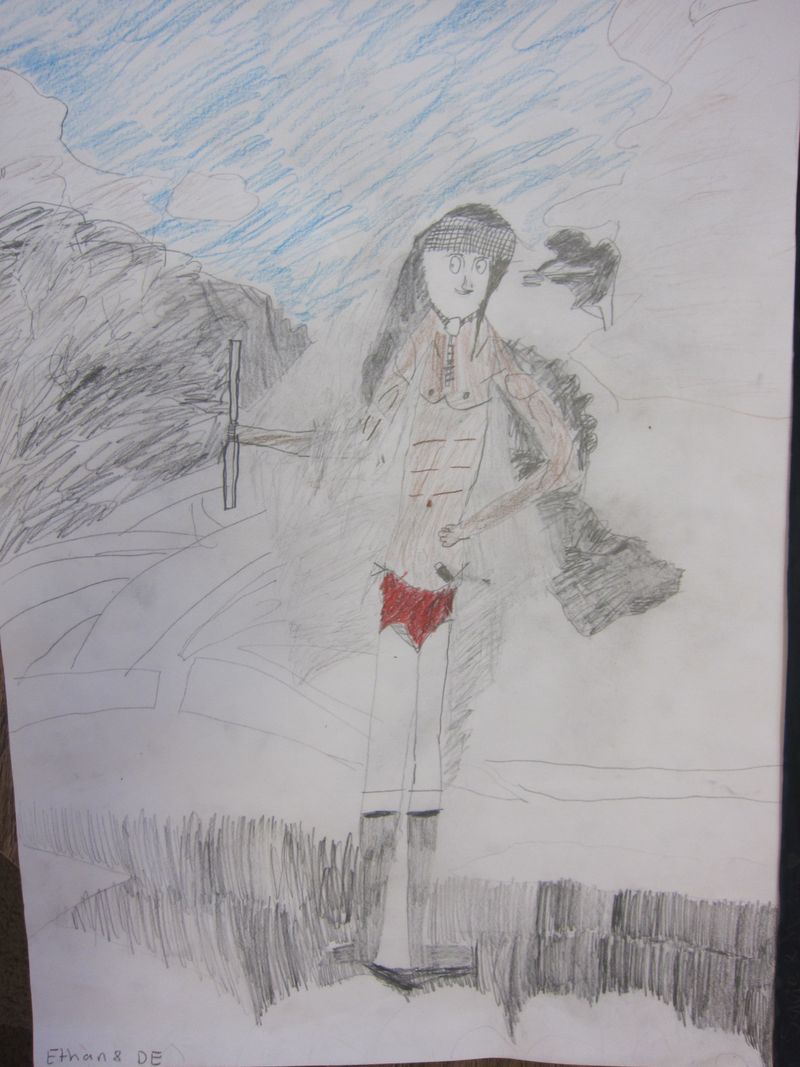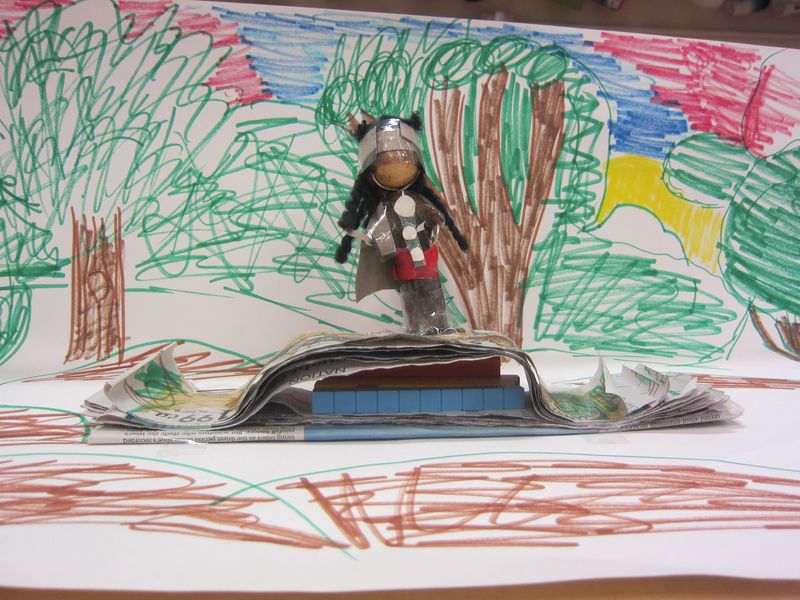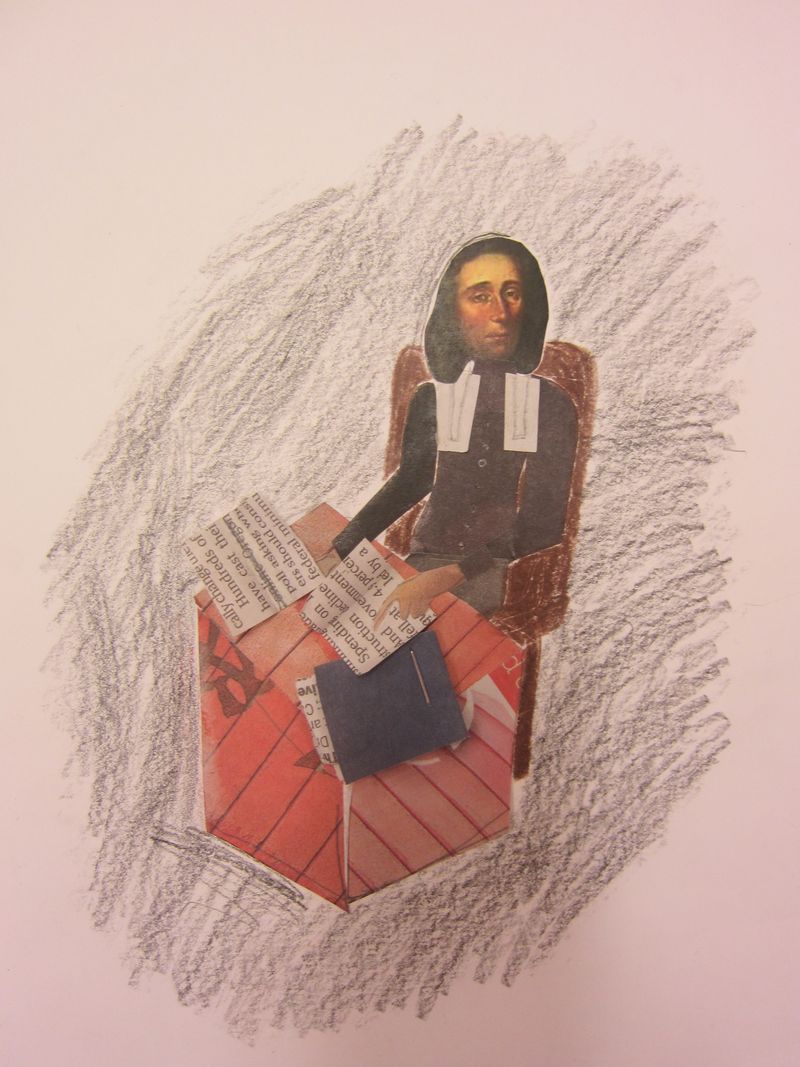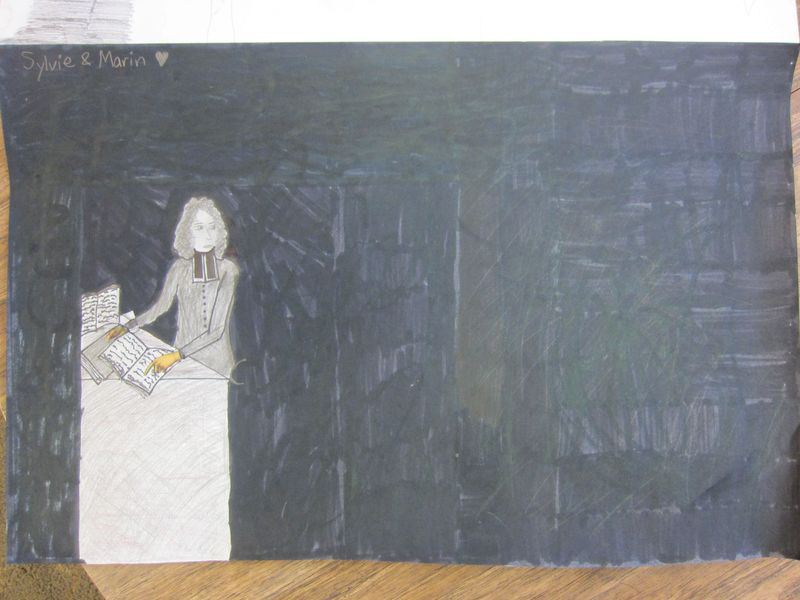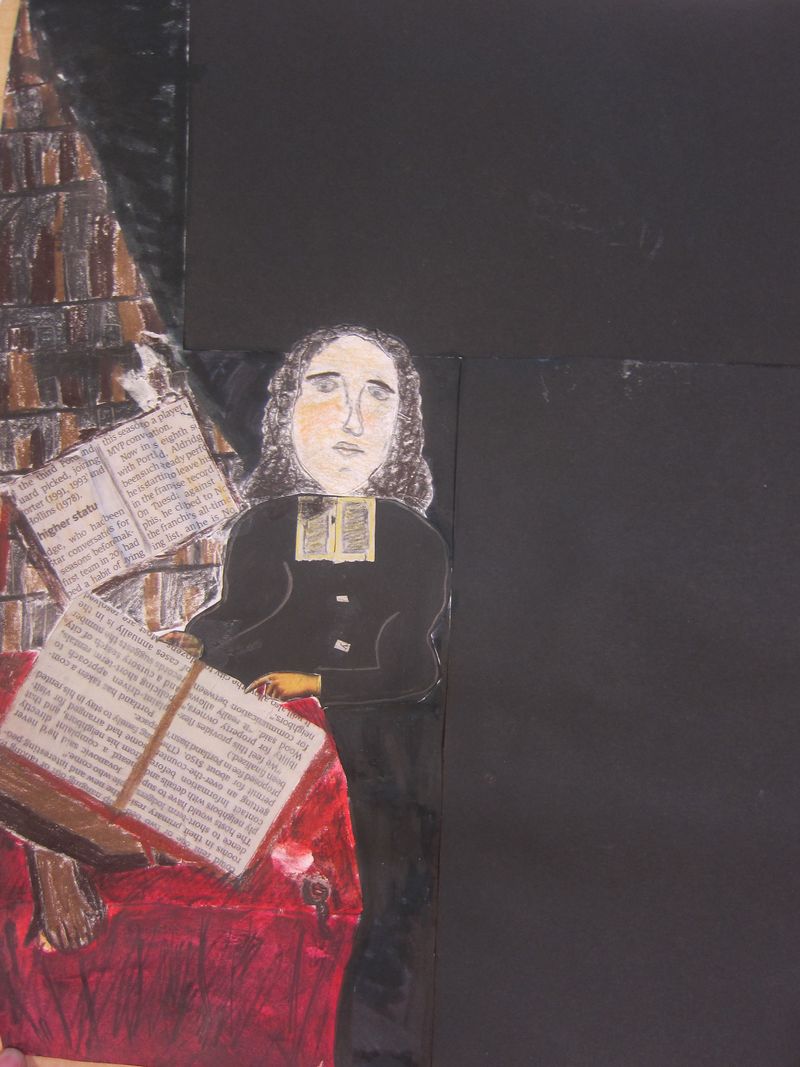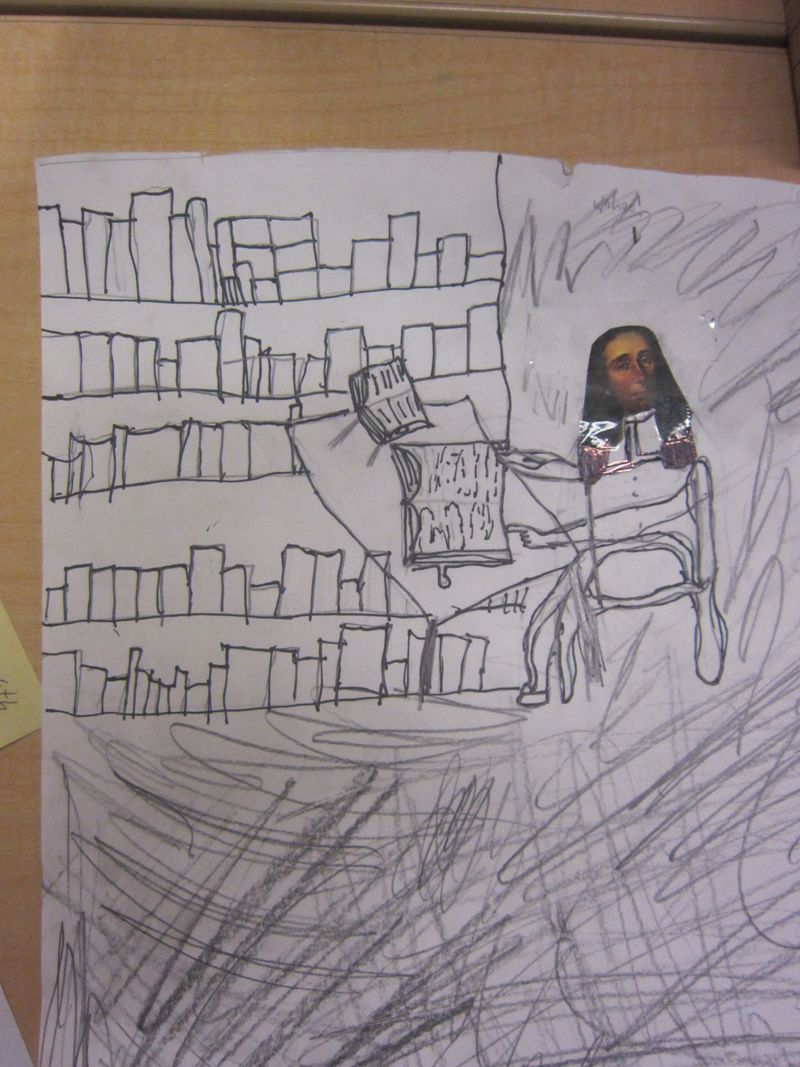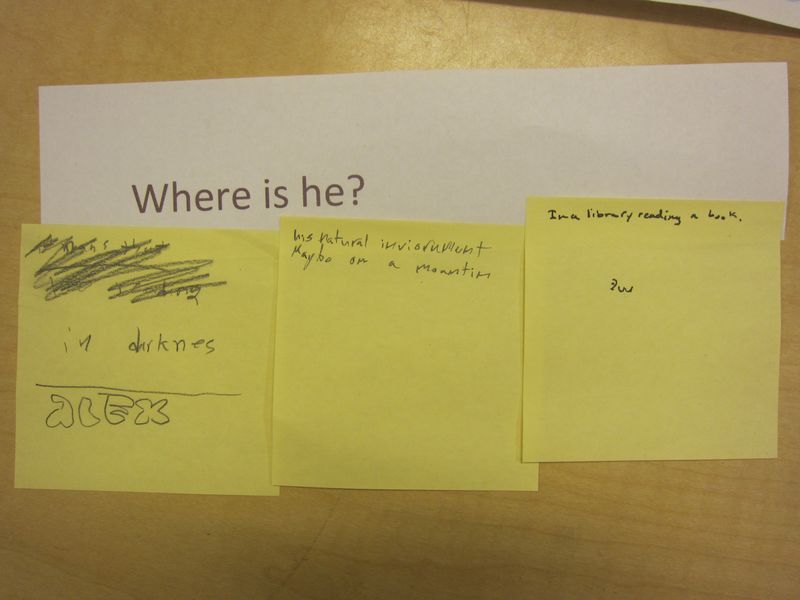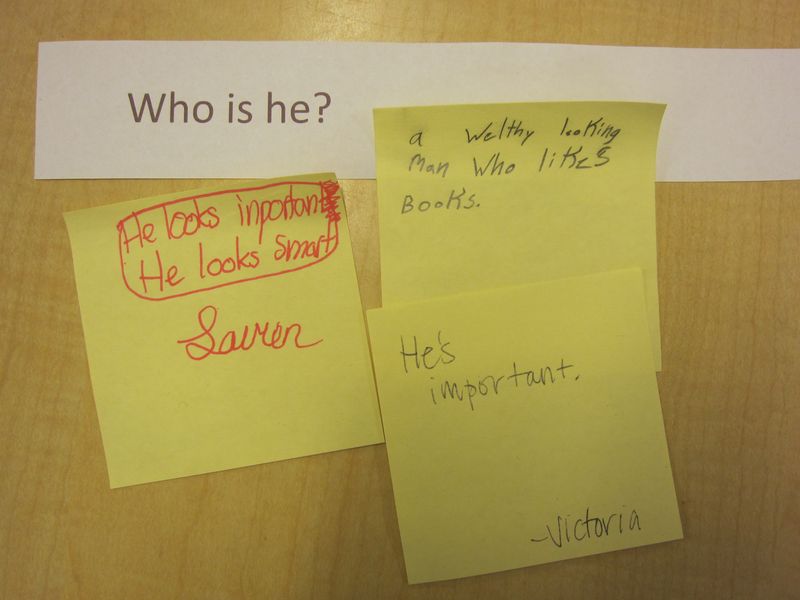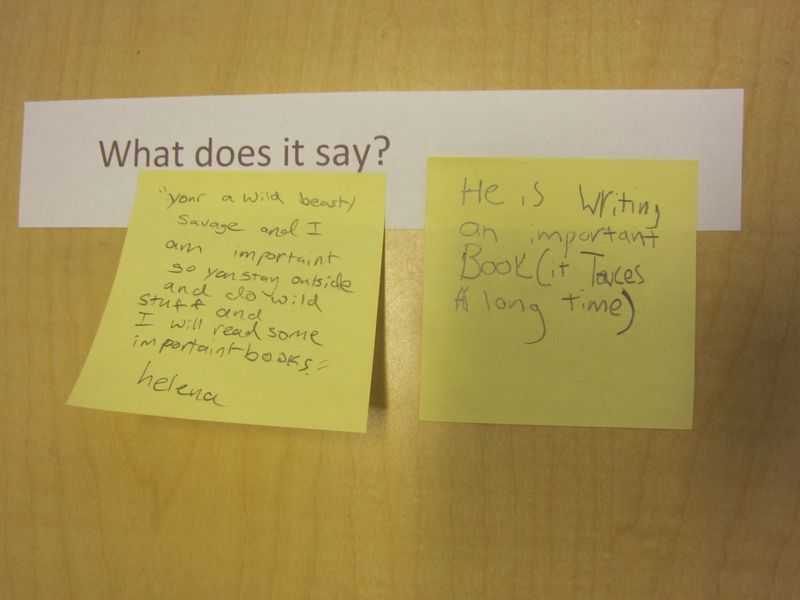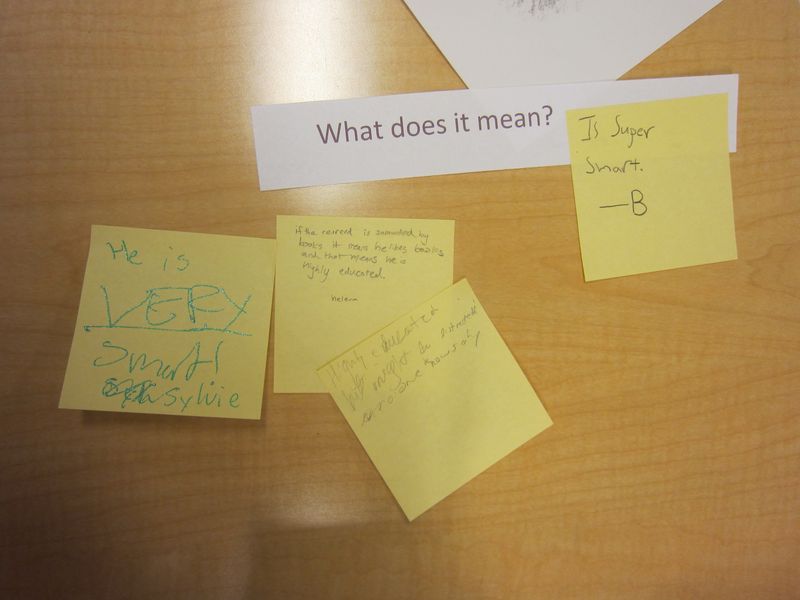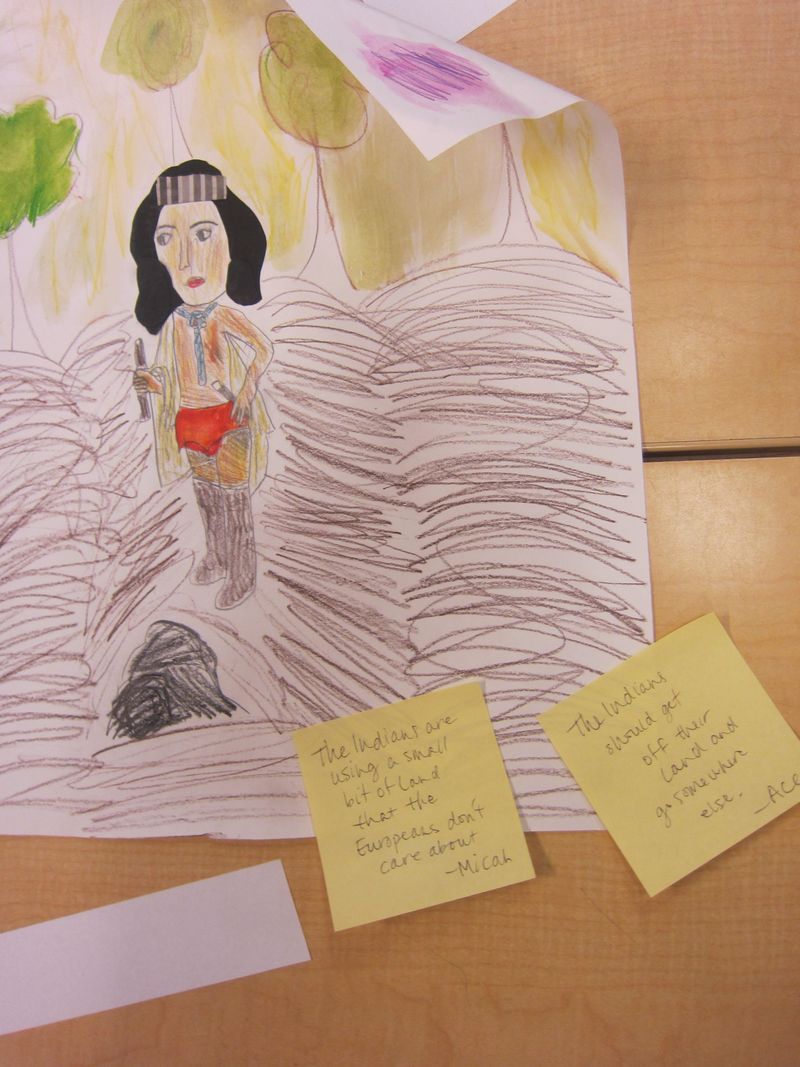Making Sense of Transitions in US History
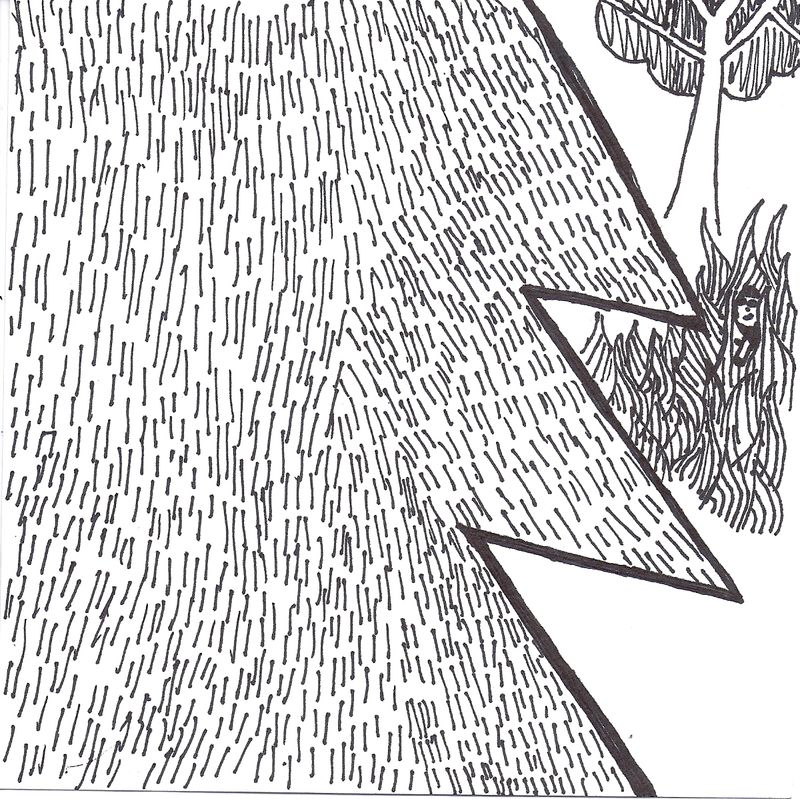
Transitioning from reenacting King Philip’s War to understanding the colonial period in US History
or
How does a deep dive into a time, place and story give fourth and fifth graders the knowledge, understanding and experience to predict what European colonists and defeated Indians will do next?
As I am sure anyone with any connection to Opal 4 has heard, the children have been very involved in the last few weeks in reenacting King Philip’s War. We all remember the Peace Treaty of 1621 that Massasoit signed alongside the Pilgrims, the one that inspired the Thanksgiving celebration that Americans remember when we celebrate Thanksgiving in November, but only one generation later, there was a great Indian rebellion led by Massasoit’s son, King Philip. He issues a list of complaints and then, by a turn of events, is thrown into war against the English colonists. This war, as the children will tell you, is “little remembered” in US history, but, Jill Lepore, a historian at Harvard University, published a book about the war and its subtitle is, “King Philip’s War and the Origins of American Identity.” She argues that as a result of this war, the seeds of American identity and independence are planted.
In our classroom, playing out the war turned out to be fun. More fun than I expected war play to be, so we took some time to capture some mental images and written memories from the war.
I felt like I couldn't peek without MC aiming a gun at my head. I was being hunted. -BC
The war was harsh and brutal today. I know am only 14 years old, but I think I am getting better at the way colonists speak. Anyway, I have to clear my mind. I am about to shoot a Wampanoag. -SK
Eventually, we all had to accept the surrender of the Wampanoag Alliance, the assassination of King Philip, and let the war end. So earlier this week, I asked the children,
King Philip’s War is over. What predictions do you have about what happens next for the colonists? What predictions do you have for what happens next with the Wampanoag Indians?
The children wrote in their notebooks and then shared their thinking with each other:
Here is the conversation that followed:
AB: I think that what’s going to happen next is the colonists, they got most of their land destroyed, they still have the land, but they don’t have settlements on it, it’s not improved. There is a lot of unimproved land. They also have a huge debt to pay back to England because they borrowed a lot of English stuff like cannons, food, guns.
AE: But they won’t have to because they are in a different place.
AB: They’re still run by the British
Levia: The thing that I am confused about right now that I hear Ace wondering about too – the people who fought this war are English, there is no such thing as being an American, they are just English people living on this soil.
MG: Do they call it England?
Levia: They call it New England. That’s why, it’s England, just different land.
RF: There is a leader who leads them there, he is still under the control of the King of England. He is the one who has to pay back all the debt.
KG: If they were living in England, they would be completely under the king’s control. The reason they came here to America was so they could have their own religion. So they have the tiniest bit of free- independence.
BC: The leader is letting them go there, and have independence from there, but they are still under their leadership.
MG: They can pay in land. Nowadays, I don’t think we’re fighting wars for land, it’s more about religion or oil, but they were fighting for land, they get land.
Levia: What resources are there on this land that the colonists can use to repay the war debt?
AB: Wood! Soil! But they have to pay for the people to cut down the trees and the ships and the axes.
RD: They just have to pay him back for all of the stuff they just used and he’s not even fighting in the war.
MG: He thinks all of this fighting is his, but later it won’t be his.
RD: He doesn’t really have to care.
Levia: Does the King of England care if the colonists are successful in the New World?
QS: He kicked them out, but he is helping them.
Levia: What does the King want from these people in the new world?
Land! Resources!
MG: If these people are still part of England, it’s pretty much considered that it’s his land. He has control over it.
DW: He owns the people so he owns the land. He owns everything that his people own.
MG: He’s probably going to ship people over to live there, and now that a lot of other countries are figuring this out that there is all this land here, they are going to try it too, and the king will say, “I found this first.”
LH: Why would the King of England want all of this land?
BC: He wants to rule everything. I think he let them go because he wanted to be the first one to get there and when they actually found it he was like, happy because he was the first one to find it and he since he already had some of his kind there then everybody else knew that he is the ruler of that whole huge piece of land. The reason he wants all of that land is because he wants to spread out and he wants to, I think he wants to rule a lot of other people so he can be the ruler of the world.
MG: Bodhi, I don’t think he planned on having them – he figured out that there was a war going on and they were getting land – you’re saying he was shipping them over there for a reason, but I feel like he didn’t know –
?: He’s a greedy king.
SL: All he wants is money and land.
HG: I bet he’s really scared once they become independent and the money isn’t his anymore.
Levia: Any other predictions?
BC: The colonists will force the colonists to force the Indians to abandon their way of living and become English. Wear Pilgrim clothes, go to church.
IM: For the Indians to become English, they could just pretend to be Christian.
NT: They know how to win a war.
RD: Colonists will celebrate.
SK: Would they send the remaining Wampanoags back to England to be slaves? Or send them to Africa?
AB: Yeah, send them to England to pay back for the war money.
RF: They probably did.
Levia: Are you wondering how the colonists figured out they can be independent and live without the king? That’s a really good question. Way more people are here so they don’t need as much help from England, from the Mother Country. Have you heard that before – England was the mother country, the one that took care of us.
BC: And America is the son country.
MG: That’s going to shift.
Levia: Just a little baby who is hopeless.
KG: Who is growing up!
AB: One day it will change.
KG: Around the age of a soldier it starts fighting back.
BC: But the country itself is as old as time. It’s been there since the dinosaurs.
SK: Is it a mother country that sends off its little baby to go be helpless somewhere else and then it grows up and sends off its own little baby to go take stuff over and stuff.
AI: Like Lewis & Clark!
The children made such accurate and insightful predictions, and we teachers wondered what else we could do to help them see how the English colonists saw their situation after the war. Jill Lepore called our attention to these two images, both painted by English artists circa 1690.
Reverend Increase Mather, Joan van der Spriet, 1688
Ninigret, Narraganssett chief
Unidentified artist, 1691
We know at Opal School that if we want children to slow down, look closely and notice details in an object or an image, we ask them to draw or recreate it. This is what we did with these images. We asked the children,
How can you work with your tablemates to recreate these two images?
The materials they had were one large sheet of drawing paper per table and some cut pieces of the Oregonian. I knew that one message in the paintings is that the colonists have “literal advantage” over the Indians, that they can read and write and the Indians cannot. I wondered if the children would see the text in the image of the Reverend Mather and want to use the newspaper and make that connection to the power of literacy in European culture.
Today we had a gallery walk and looked at all of the images.
I asked the students to leave sticky notes at each poster that would respond to the following questions:
Where is he?
In darkness -AE
His natural environment, maybe on a mountain. -MB
In a library, reading a book. -DW
Who is he?
He's important, he looks smart. -LH
He's important. -VR
A wealthy looking man who likes books. -MB
What does it say?
You're a wild, beasty savage and I am important so you stay outside and do wild stuff and I will read important books. -HG
He is writing an important book. (It takes a long time.) -BC
(not pictured) We are not the same, we are different. -MB
What does it mean?
He is VERY smart! -SR
If the reverend is surrounded by books it means he likes books and he is highly educated. -HG
What does it matter?
The Indians are using a small bit of land that the Europeans don't care about. -MG
The Indians should get off their land and go somewhere else. -AB
And part of the conversation that followed:
KG: “Someone high up who probably has lots of servants.” Helena wrote that.
Levia: Does that mean he is wealthy?
KG: It is showing he is upper class.
MG: The Indian is in the wild, there is no show of wealth.
AB: It’s unimproved.
MM: The Indian is out on the land.
MG: They are showing other Europeans that living out there is for the Indians so the other Europeans will know that they are in charge.
BC: That is what he painted…
RD: The Indians should be outside. They are savages, uncivilized, and we are inside, with books, we are civilized, we have five forks!
MG: They didn’t do anything to the Native Americans, they are in their rightful place.
HG: God said so.
Teacher Reflection
It was really powerful for me to put all of this rich work and thinking into one blog post, and it all took place in such a short amount of time. This blog post feels like a celebration of this class’s ability to work together to construct an understanding of so many of the ideas that inform the colonial period of US history. BC’s explanation of Imperialism is a strong example:
He wants to rule everything. I think he let them go because he wanted to be the first one to get there and when they actually found it he was like, happy because he was the first one to find it and he since he already had some of his kind there then everybody else knew that he is the ruler of that whole huge piece of land. The reason he wants all of that land is because he wants to spread out and he wants to– I think he wants to rule a lot of other people so he can be the ruler of the world.
At Opal School we believe that by taking a deep dive into one story and allowing children to experience that story through all lots of different modalities, approaches, materials and languages, and especially through perspective taking, they construct ideas that transcend the one story and allow them to see other stories (and histories and conflicts) through their new lens. I believe that is what happened here, and I am already seeing how the children are synthesizing their thinking and applying it to “future” stories in US History.
To me this is obvious in how the children worked out together how America will gain independence and then take over the role of, according to SK, “sending off its own little baby to go take stuff over and stuff.”
Levia: Have you heard that before – England was the mother country, the one that took care of us?
BC: And America is the son country.
MG: That’s going to shift.
Levia: Just a little baby who is hopeless.
KG: Who is growing up!
AB: One day it will change.
KG: Around the age of a soldier it starts fighting back.
BC: But the country itself is as old as time. It’s been there since the dinosaurs.
SK: Is it a mother country that sends off its little baby to go be helpless somewhere else and then it grows up and sends off its own little baby to go take stuff over and stuff.
AI: Like Lewis & Clark!
I wonder how rich their exploration of the colonial period in history will be now that they have these stories this fall!


